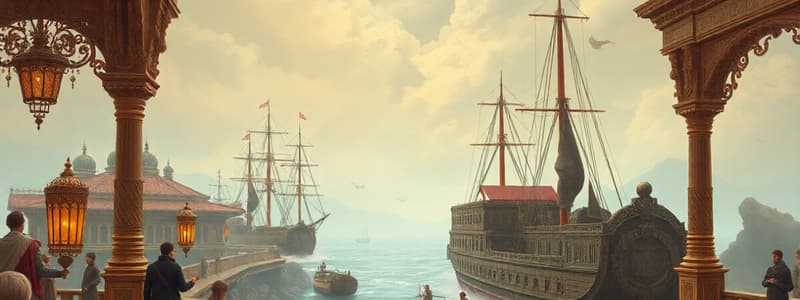Podcast
Questions and Answers
Transportation was used to go to places and discover ______.
Transportation was used to go to places and discover ______.
horizons
Communication is essential in their endeavors to ______.
Communication is essential in their endeavors to ______.
discover
A major problem faced was the scarcity and increased demand for food and basic ______.
A major problem faced was the scarcity and increased demand for food and basic ______.
necessities
Weapons and armors were developed for ______ and protection.
Weapons and armors were developed for ______ and protection.
Architecture is considered a status symbol among nations for how advanced their ______ is.
Architecture is considered a status symbol among nations for how advanced their ______ is.
The first writing system developed by the Sumerians is called ______.
The first writing system developed by the Sumerians is called ______.
Uruk is considered the first ______ in the world.
Uruk is considered the first ______ in the world.
The Great Ziggurat of Ur/uk served as a sacred place for their chief ______.
The Great Ziggurat of Ur/uk served as a sacred place for their chief ______.
The ______ were designed to maintain water supply and prevent flooding in Sumerian civilization.
The ______ were designed to maintain water supply and prevent flooding in Sumerian civilization.
The Hanging Gardens of Babylon were built by King Nebuchadnezzar II for his wife ______.
The Hanging Gardens of Babylon were built by King Nebuchadnezzar II for his wife ______.
Papyrus plants were used to create a type of ______ in ancient Egypt.
Papyrus plants were used to create a type of ______ in ancient Egypt.
The ancient Egyptians invented ______ to protect their shaved heads from the sun.
The ancient Egyptians invented ______ to protect their shaved heads from the sun.
In Greek civilization, the ______ was used as a timekeeping device made with water.
In Greek civilization, the ______ was used as a timekeeping device made with water.
The Roman civilization is often regarded as the cradle of ______ and governance.
The Roman civilization is often regarded as the cradle of ______ and governance.
The ______ was utilized in agricultural processes to aid in the milling of grains.
The ______ was utilized in agricultural processes to aid in the milling of grains.
Flashcards are hidden until you start studying
Study Notes
Ancient Transportation
- Ancient people used transportation to explore new places and find resources
- They relied on it for trading goods and communicating with others
Ancient Communication
- Communication was essential for exploration and trade
- It enabled interactions with indigenous populations
- Record keeping helped to document trade and historical events
Ancient Challenges And Solutions
- A shortage of food and basic necessities led to the development of technology
- This included methods for increasing food production and securing resources
Ancient Weapons and Armors
- Weapons and armor were used for self-defense and protection
Ancient Conservation of Life
- Early civilizations faced health challenges such as illnesses and diseases
- This spurred technological development in medicine and healthcare
Ancient Engineering
- Engineering played a crucial role in meeting human needs
- It facilitated the construction of buildings and infrastructure
Ancient Architecture
- Architectural designs were a symbol of technological advancement
- They reflected a civilization's status and identity
Sumerian Civilization
- Located in Mesopotamia, the Sumerians were renowned for their technological achievements
- They developed the first writing system, known as cuneiform
- The city of Uruk is considered the first city in the world
- The Sumerians built the Great Ziggurat of Ur/Uk, a complex structure dedicated to their chief god
Sumerian Water Management
- Irrigation systems and dikes were built to manage water resources and prevent flooding
- These advancements enabled continuous farming and increased food production
Sumerian Transportation
- Sail boats were used for transportation and trade, facilitating cultural exchange
- The invention of the wheel revolutionized farming and food processing
Sumerian Agriculture
- The plow, an essential tool for agriculture, allowed for faster and more efficient land cultivation
Babylonian Civilization
- Located near the Tigris and Euphrates rivers, the Babylonians were skilled builders, engineers, and architects
- The Hanging Gardens of Babylon, a legendary structure, were said to be a testament to their architectural prowess
- While the existence of the Hanging Gardens is debated by historians, it remains a remarkable example of Babylonian ambition
Egyptian Civilization
- Located in North Africa, the Egyptian civilization was known for its majestic pyramids, built by Pharaohs
- The Egyptians invented papyrus paper, made from a plant abundant along the Nile River
- Papyrus paper was used for communication, record keeping, and official correspondence
- The Egyptians developed ink, a mixture of soot and chemicals, used to write on papyrus
- Their hieroglyphic writing system, believed to have been given by their Gods, has provided insights into ancient Egyptian history and culture
- The Egyptians invented wigs for both health and beauty, protecting them from the sun's rays
- The water clock, or clepsydra, was a timekeeping device that measured time by the flow of water
Greek Civilization
- Located in Southeastern Europe, the Greeks were pioneers in philosophy, mathematics, and technological advancements
- The invention of the alarm clock, which used water or sand to sound an alert, is attributed to the Greeks
- The water mill, a machine powered by water, revolutionized agriculture and food production
Roman Civilization
- The Roman civilization, known for its political and social power, was a model for governance and legislation
- Rome was a hub of technological innovation, contributing significantly to the advancement of science and technology
- The Roman Empire developed numerous significant inventions that contributed to its prosperity and influence
Studying That Suits You
Use AI to generate personalized quizzes and flashcards to suit your learning preferences.




